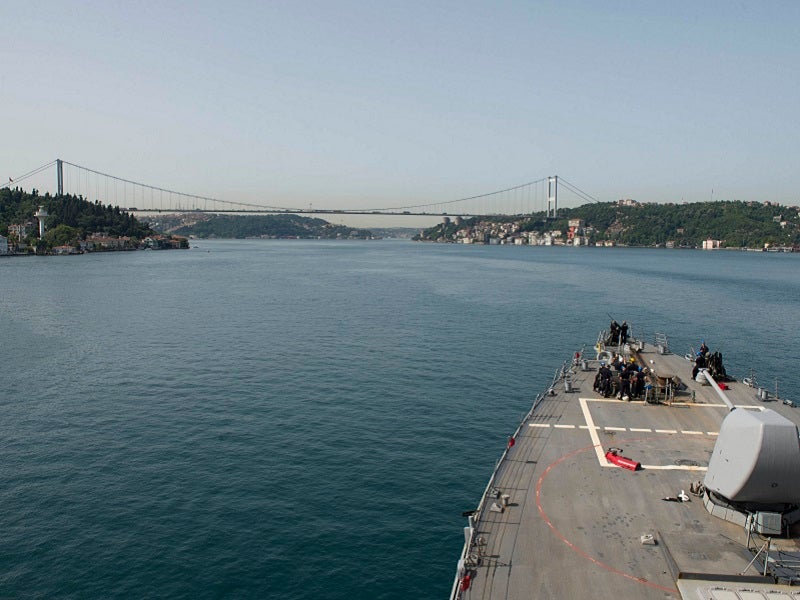
The apparent transit of a merchant vessel carrying military equipment for Russia through the Bosphorous Strait highlights once again the diplomatic balancing act that Türkiye has been playing in recent years, as both a member of NATO and a country that enjoys close ties with Moscow.
At the outset of Russia’s invasion of Ukraine in February this year, Türkiye enacted the 1936 Montreux Convention that allows it to limit naval transits of the Dardenelles and Bosphorous straits, effectively introducing a Black Sea maritime arms trade embargo on the two countries and their backers.
Should Türkiye have permitted the transit of the Russian shipment, apparently containing elements of the S-300 air defence missile systems, it would be in breach of its own announced commitments. The shipment itself was purportedly made using the Greece-flagged but Russian-chartered bulk carrier Sparta II.
According to the MarineTraffic maritime monitor, the Sparta II, as of 30 August, was at the Russian port of Novorossiysk, arriving there following a seven-day transit from Tartus, Syria. Russia operates a naval base at Tartus, its only Mediterranean base, in support of its operations in Syria and the wider region.
Taking exception to the exception Türkiye could have made to the Montreux Convention, the Ukrainian Ministry of Foreign Affairs (MoFA) took the unusual step on 29 August of calling the Turkish ambassador to the country, Yagmur Ahmet Guldere, to the ministry for a public dressing-down.
In the 29 August statement, the Ukrainian MoFA expressed its “concern” regarding the “transportation of S-300 missile systems from Syria to Russia via the Bosphorous Strait” by the Sparta II, which was chartered by the Russian Ministry of Defence.
The Turkish envoy was handed a verbal note by the Ministry of Foreign Affairs on the raised issue, the Ukrainian MoFA said.
In addition, the Deputy Minister of Foreign Affairs of Ukraine, Mykola Tochytskyi, “requested the Turkish side to provide official information regarding the cargo that was transported by the ship Sparta II through the Bosphorus Strait, as well as regarding the measures taken by Türkiye in order to fulfill the provisions of the [Montreux] Convention and prevent further escalation of the Russian-Ukrainian war.”
Further, the Ukrainian MoFA “expressed hope” that Türkiye will “strictly adhere” to its decision to close the Black Sea straits to naval vessels.
A recipient of Ukraine’s grain
Türkiye is also a leading player in the Black Sea Grain Initiative (BSGI), which was created by the UN to allow Ukrainian grain and foodstuffs languishing in ports due to the Russian naval blockade to be shipped out of the country to desperate world markets. Merchant traffic operating under the BSGI must travel to inspection points inside Turkish territorial waters to ensure that they are not illicitly transporting arms.
In addition, Türkiye has also been the largest recipient of Ukrainian grain and foodstuffs under the BSGI, receiving, as of 27 August, 21% of all good transported under the initiative. The next most common destinations for Ukrainian grains were the Republic of Korea (13%), Iran (12%), Egypt (11%), Germany and Sudan (6%), the Netherlands (5%), China and Romania (4%), Ireland and Italy (3%), Djibouti, India, Israel, and Lebanon (2%), and France and Greece (1%).
More than one million metric tons of Ukrainian grain and foodstuffs have been transported out of the country since the inception of the BSGI.
Turkish relations to fellow NATO members have had a chequered past, with the country being ignominiously suspended from the US-led F-35 stealth fighter programme in 2019, despite being one of its leading partners, following Ankara’s decision in 2017 to buy the Russian-made S-400 air defence missile system.
In 2020, the US imposed sanctions on Turkey under the Countering America’s Adversaries Through Sanctions Act (CAATSA), for “knowingly engaging in a significant transaction with Rosoboronexport, Russia’s main arms export entity, by procuring the S-400 surface-to-air missile system”, according to an official US State Department release.
Türkiye also regularly clashes with NATO member Greece, a historical rival, on naval, economic, and diplomatic issues, while also invading Cyprus in 1974 in a conflict that led to the partition of the island. However, Türkiye also declined to halt the sale of Turkish Bayraktar TB2 drones to Ukraine this year, arguing that as a transaction completed between another state and private industry it had no cause to intervene.



